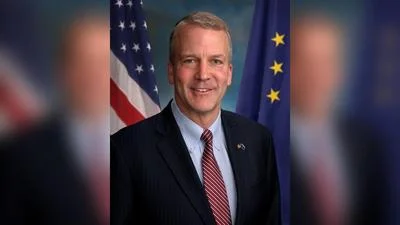U.S. Senator Lisa Murkowski | Lisa Murkowski Official website
U.S. Senator Lisa Murkowski | Lisa Murkowski Official website
U.S. Senators Lisa Murkowski and Dan Sullivan, along with Congressman Nick Begich, all Republicans from Alaska, met with community and fisheries leaders as well as senior officials from the Trump administration to discuss priorities for Alaska’s seafood sector. The roundtable took place at the U.S. Department of Commerce headquarters in Washington, D.C.
Secretary of Commerce Howard Lutnick and Secretary of Agriculture Brooke Rollins attended the meeting, along with Dr. Kevin Hassett, director of the White House National Economic Council, and other federal officials. The discussion focused on threats to wild Alaska seafood production and marketing, as well as challenges facing the broader U.S. seafood supply chain. Officials also addressed how secretarial leadership and multi-agency support are needed to implement President Trump’s “Restoring American Seafood Competitiveness” executive order issued on April 17.
“Today, at the headquarters of the U.S. Department of Commerce, our Congressional Delegation and Alaska leaders had the unique opportunity to collaborate with Commerce Secretary Howard Lutnick, Agriculture Secretary Brooke Rollins, Director of the White House National Economic Council Dr. Kevin Hassett, and other senior Trump administration officials on strategies to bolster the industry at the Alaska Seafood Roundtable,” said Senator Murkowski. “The administration is clearly seeking to elevate the seafood industry as a vital part of our nation’s economy following the directive of the President’s Executive Order, Restoring American Seafood Competitiveness. The Alaska panel outlined the challenges the seafood sector has both at home and abroad and discussed priorities such as recapitalizing our aging fleet of fishing vessels, accurate labeling of seafood products, keeping more of our seafood in America and enforcing fair trade practices for Alaska’s wild seafood. I appreciate that the administration recognizes that a whole government approach is required to ensure that our seafood industry remains the gold standard worldwide.”
Senator Sullivan highlighted difficulties faced by those working in Alaska’s seafood sector: “The men and women of Alaska’s seafood sector are tough, patriotic and resilient entrepreneurs who do not often seek help from their government. But these great Americans, and the communities they support, are facing a perfect storm of challenges: the accelerating costs of aging fleets and infrastructure, unfair competition from America’s adversaries—particularly Russia and China, and burdensome federal regulations.” He added: “On each of these fronts, our federal government has an opportunity to help tackle these challenges and protect the tens of thousands of jobs and billions of dollars in economic activity generated by our domestic seafood producers. I commend President Trump and Secretary Lutnick and their teams for issuing the critically important Executive Order 14276, ‘Restoring American Seafood Competitiveness,’ which provided a framework for our discussions today and outlines the path forward for ensuring the long-term health of our American seafood sector. I am hopeful that this roundtable meeting will be the start of a strong, closely coordinated inter-agency effort to bolster the competitiveness of Alaska seafood and ensure our incredible fishermen and Alaska’s coastal communities can continue to do what they do best: harvest the freshest and most sustainable seafood in the world.”
Congressman Begich addressed structural disadvantages faced by American producers: “Long standing challenges require new solutions, and in order to address the structural competitive disadvantages American companies experience in the international fishing industry, we must ensure American producers have an advantaged playing field at home,” he said. “Regulatory barriers add costs to capital equipment while competitors are heavily subsidized, engage in illegal, unreported, and unregulated activities, operate with low or in some cases no environmental standards, and utilize labor forces in ways that Americans would find abhorrent. Capital formation, international trade agreements, treaties, and American production provide the tools necessary for American industries to compete, and thankfully we have an America First Administration committed to engaging each of these levels for the benefit of American producers. I want to thank Secretary Lutnick and Secretary Rollins for coming to the table today with a clear-eyed problem-solving mindset to address these challenges.”
According to data shared during discussions at this meeting—the Alaska seafood industry employs about 48,000 workers statewide across more than 142 communities.
Alaska fisheries leaders present included Alvin Osterback (mayor of Aleutians East Borough), Vincent Tutiakoff (mayor of Unalaska), Matt Alward (president United Fishermen of Alaska), Joe Bundrant (CEO Trident Seafoods), Cora Campbell (president & CEO Silver Bay Seafoods), Eric Deakin (CEO Coastal Villages Region Fund), Luke Fanning (CEO Aleutian Pribilof Island Community Development Association). Other federal officials participated representing agencies including NOAA; U.S State Department; USDA; Department Health & Human Services; among others.






 Alerts Sign-up
Alerts Sign-up